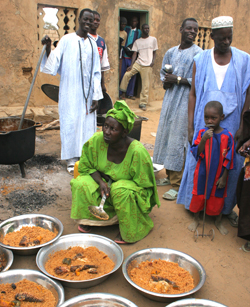You are here » Home » Telling Our Story
Success Story
Meal program provides food to keep students off streets and in school
Less Begging, More Learning for Pupils

Photo: Richard Nyberg, USAID/Senegal
"Community members in Mboumba, Senegal, prepare meals for students that consist of U.S.
commodities such as bulgur, lentils, vitamin A-enriched cooking oil, and dehydrated
potatoes."
The time that these children spent looking for food to eat in the village is now time devoted to learning,” said Thierno Dauda Tall, a schoolteacher in Senegal.
“Ngir Yallah”, they say as they wander the streets and dusty roads of Senegalese towns and villages. “For God”, these youngsters, ages 5 to 18, plead daily of travelers, visitors, and well-to-do residents. At night, after combining money and food from a day spent begging, the students eat and their studies begin.
Such is the life of many traditional students throughout Senegal. Thierno Dauda Tall, the teacher of the community school of Bode, sees direct benefits from the support provided by the USAID-funded vulnerable school program.
Tall, a teacher since 1973 who runs this small school, faces the daily challenge of feeding his students and providing them with an adequate life on the limited money he collects from students’ parents and through begging. “Today, my school realizes positive changes in feeding, hygiene and overall improved living conditions,“ he said. “Previously, each year I would travel with my students to look for food and other essentials for the students, which would worry the children’s parents. Today, this has all changed, primarily due to the food distribution program that allows us to remain in the school and concentrate on learning.”
The program, which supports 3,800 students in northern Senegal, aims to improve their living and learning conditions. From January to September 2007, nearly 1.8 million meals were served to the children. The project provided nearly 238 metric tons of food, of which over 191 tons came from USAID’s Food for Peace program.
“The time that these children spent looking for food to eat in the village is now time devoted to learning and has increased the rate at which they learn,” said Tall. “Every student now knows exactly what is for lunch and dinner, how it is prepared and understands how valuable this is, especially since food received through begging can make my students ill due to poor quality and hygiene, which are usually ignored. Now, the students do not have to go to bed and spend the night with upset stomachs and diarrhea.”
Print-friendly version of this page (533kb - PDF)
Click here for high-res photo
Back to Top ^ | 

